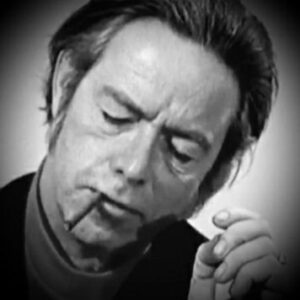 The next spiritual pioneer I’ve chosen is Alan Watts, born in January 1915 in Chislehurst in Kent. There are mixed responses to his life and work – partly because of his careless and unconventional personal life, and, also because although writing brilliantly about the search for God and truth he tended not to ‘live it’. Interested in psychoanalysis and Jungian psychology he said that psychotherapy bored him, while he felt too much meditation ‘is apt to turn one into a stone Buddha’.
The next spiritual pioneer I’ve chosen is Alan Watts, born in January 1915 in Chislehurst in Kent. There are mixed responses to his life and work – partly because of his careless and unconventional personal life, and, also because although writing brilliantly about the search for God and truth he tended not to ‘live it’. Interested in psychoanalysis and Jungian psychology he said that psychotherapy bored him, while he felt too much meditation ‘is apt to turn one into a stone Buddha’.
Watts by the age of 20 had published The Spirit of Zen; in it he introduces the ideas of Zen to the western reader. Later after moving to the US, he briefly trained and worked as an ordained Episcopalian priest and then immersed himself in Zen Buddhism, Taoism and a deep and life long preoccupation with the question of identity, and the search for the true self. He wrote extensively, gave endless talks and was a regular on TV and the radio. He wrote more than 25 books – and also had some interesting things to say about Christianity. He called himself a ‘genuine fake’, a ‘spiritual entertainer’ and was seen as a ‘counter-cultural mystic’. He turned on many in the west to meditation and Zen Buddhism. His books helped thousands of people and his you tube videos are apparently watched still by millions. Watts famously said that Zen does not confuse spirituality with peeling potatoes and thinking of God, but spirituality is the act of peeling the potatoes: the potato ‘is it’. Awareness of being present in the ordinary here and now is enlightenment.
Steeped from his youth in the Church of England Watts was way ahead of his time about where Christianity might be heading. Commenting on ‘the death of God’ movement in the 1960s he suggested that it was not God who was dying, but a particular way of thinking and talking about God that had died ‘by becoming implausible’. He suggested a return to the God of the theological mysteries, a God not limited by our concepts, or our pitiful need for security.
‘The highest image of God is the unseen behind the eyes – the blank space, the unknown, the intangible and the invisible. That is God! We have no image of this. We do not know what that is, but we have to trust it. There’s no alternative … That trust in a God whom one cannot conceive in any way is a far higher form of faith than fervent clinging to a God of whom you have a definite conception.’
The main trouble with Church religion is that people are taught to carry out spiritual exercises on a sort of imitative basis – because the saints did it – we do the same, but this means that leaves a terrible vacuum at the heart of piety.
Some other good quotes from Watts:
‘No one is more dangerously insane than one who is sane all the time: he is like a steel bridge without flexibility, and the order of his life is rigid and brittle.’
‘The only way to make sense out of change is to plunge into it, move with it, and join the dance.’
‘Technology is destructive only in the hands of people who do not realize that they are one and the same process as the universe.’